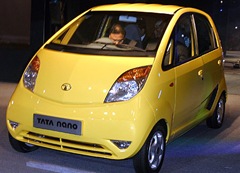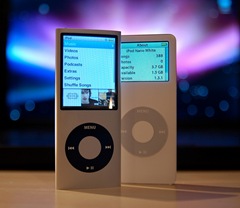Could Tata Nano be the iPod and iPhone of cars?
Or is it already? If someone has followed the music player industry -which is not very difficult to follow, the transformation is phenomenal. From Gramophones to tape recorders to walk mans to disc mans and finally to the ubiquitous yet lovely iPod’s – the metamorphosis took years. For music players size matters which directly translates to portability. The same logic does hold good for cars.
For cars, size really doesn’t matter. The bigger the better – or so was the traditional thinking. It took the oil shock of the 1970’s for people to realize that bigger is not always better and brought in new fuel standards. But that shock passed and people went back to their old fuel consuming ways. 
The shock has returned. Now, it is just not one but 3 shocks of greater magnitude.
- Oil went up to $147 per barrel which made everybody think that the world is running out of oil.
- Whole world went into a recession with a horizon of 2 years to get back to normal. This recession has forced people to undo old way of doing things and come up with new ways.
- Finally, the world is getting hotter. Global warming is no longer a jargon or a hoax but imminent. Many people realize this – except for car companies.
All these things have forced people to look for better cars. Small, fuel efficient and environment friendly cars. Fuel guzzling SUV’s are not the answer the world is looking for – Tata Nano is.
Unlike other small cars, Tata Nano is affordable. With a 623 cc engine it is a cross between high-end motorcycle and low-end Maruti 800. Just like iPod, Tata Nano strips out everything that is not necessary.
iPod has weeded out most of the things like the play/pause, stop and rewind buttons and introduced a jog dial. This is effective and efficient. Similarly, Tata Nano has leaned out most of the things that go with cars.
What exactly did Nano leaned out : 
- Most of the parts are plastic, which reduced weight, cost and increased fuel efficiency.
- The engine is small which has just enough horse-power to lug 4 people across the city.
- There is only one wiper. Not a big thing but in the grand scheme of things little things like these matter. Just like your small purchases add up to your final bill.
Most of the innovations come from understanding the market. Tata Nano has done just that. It is a perfect car for developing nations like India. I wish it came earlier which would have made many of the small cars plying on the Indian roads obsolete.
Nano’s innovation are numerous as this BusinessWeek article points out :
The Nano engineers and partners didn’t simply strip features out of an existing car—the tack Renault (RENA) took with its Dacia Logan, which sells in India for roughly $10,000. Instead, they looked at their target customers’ lives for cost-cutting ideas. So, for instance, the Nano has a smaller engine than other cars because more horsepower would be wasted in India’s jam-packed cities, where the average speed is 10 to 20 miles per hour.
Just to summarize the innovations made by Tata Nano as pointed by BusinessWeek:
- The car was built from ground up.
- The supply chain was simplified by making the suppliers partners.
- Shipping the whole car as kits for the downstream distributors to assemble, thus reducing several costs.
- The key success factor for Tata Nano project was price. The price was fixed and everything else just worked around it.
Tata Nano marks the beginning of a slew of small and fuel efficient cars. Just like what happened with iPod’s and iPhone’s, every small car will be compared with Tata Nano. The day when every car is compared with Nano is not too far.
The launch date of Nano – March 23 – should be declared a national holiday. Maybe that’s too far fetched but you get the point don’t you?
PS : For those who think Nano is a environmental disaster, here is my solution : Nano should meet Reva.
*Img source

i don’t agree that price is the only thing can make Tata Nanosuccessful. you see despite the price, Tata Motors was able to get only 2 lakh booking instead of the earlier projected 10 lakh bookings. Market was very dicey for Tata Nano. It is way the market. A quality of a car is of utmost importance to people even in developing countries like India.
Rahul
Indian Car Advisor (Carazoo.com)
@Shyam : You lost me when you talk about public transport and subsidies because that is a fully different discussion.
@Shyam : I am glad you have a WTF view on this. The idea is simple. It is not about buttons or tyres. It is about getting the job done. iPod does music, Nano does travel. Everything else is semantics.
iPod used to be expensive but not anymore. If cost was the reason why people did not have many ipods’s lets say 2 years ago, supply will be the reason why not many people will have Nano.
There have been some good articles here. But this one’s totally WTF.
Apple took out buttons from the iPOD – not features – from the ipod. Hardly the case with Nano.
iPod costs more than other music players – it used to be exclusive. Exactly the opposite case here.
And when you think about it people dont really care about shortage of fuel or the environment as a whole. It’s the cost to them that matters. (Yes, I know – supply and demand. But subsidies are a big deal here when you talk about fuel.)
For the sake of argument, Tata Nano may turn out to be a good thing – the best thing if you say so – for India and the world. I sure hope so.
The ideal way would be a highly available, cost effective Public transport system – not cars.
That’s the govt’s incapability driving Tata’s enterprise. Nothing new.